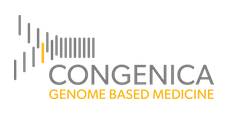Channels
Special Offers & Promotions
Elucigene Partners with Congenica on New NGS Cystic Fibrosis Kit
Accurate variant analysis facilitates personalised care pathways
 The emergence of new therapies that treat the causes of cystic fibrosis are creating an imperative for more accurate variant analysis. A genetic diagnosis for more than 95 per cent of patients is achievable with a new cystic fibrosis (CFTR) gene analysis kit developed by Elucigene Diagnostics, a leading developer and distributor of prenatal and human genetics diagnostics, in partnership with Congenica, a leader in genomic analysis and interpretation. The “all-in-one” kit allows sample processing, analysis with next generation sequencing (NGS) and variant interpretation streamlining the diagnostic process.
The emergence of new therapies that treat the causes of cystic fibrosis are creating an imperative for more accurate variant analysis. A genetic diagnosis for more than 95 per cent of patients is achievable with a new cystic fibrosis (CFTR) gene analysis kit developed by Elucigene Diagnostics, a leading developer and distributor of prenatal and human genetics diagnostics, in partnership with Congenica, a leader in genomic analysis and interpretation. The “all-in-one” kit allows sample processing, analysis with next generation sequencing (NGS) and variant interpretation streamlining the diagnostic process.
Dr Mark Street-Docherty, Commercial Manager for Elucigene Diagnostics, says: “Congenica has produced a bespoke analysis and reporting pipeline to support customers using our new targeted NGS kit for CFTR gene analysis.
“The Congenica and Elucigene partnership will provide support to CFTR diagnostics, reporting only clinically relevant information, and therefore simplifying analysis associated with competitor whole genome approaches.
“Congenica’s Sapientia™ platform will form part of our offering to the customer, enabling seamless sample processing and analysis.”
Craig Taylor, Head of Business Development for Congenica, says: “We’re very excited about partnering with Elucigene and introducing Sapientia to clinical labs around the world, enabling them to benefit from the same interpretation and analysis platform employed by leading NHS Hospitals in the UK. This partnership illustrates the flexibility of Sapientia, which can be customized according to partner needs."
Cystic fibrosis is an inherited disorder affecting approximately one in every 2,500 live births in Caucasians. It is due to mutations in a single gene (CFTR) that controls the movement of water and chloride ions across the cell membrane.
People affected by the disease experience a build-up of thickened mucus in their lungs and other organs, leading to challenging life-limiting symptoms.
Additionally, some male carriers of the condition experience reduced fertility (azoospermia) due to the congenital bilateral absences of the vas deferens (CBAVD). The CFTR gene analysis test meets the needs for fertility testing.
Over 2,000 DNA sequence variants have been identified within the CFTR gene, of which approximately 250 are classified as disease causing. Knowing the exact variant is vital, as the patient’s symptoms and response to drug treatment can vary widely depending on which mutation affects the CFTR gene. As such, this test will enable the development of personalised disease management for patients.
The new product is the first in Elucigene’s range to embrace next generation sequencing. Elucigene has developed probes specifically designed to deeply sequence, with higher confidence, the areas of the CFTR gene where the targeted variants occur. This has increased the detection rate from between 85 to 95 per cent to over 99 per cent for some populations.
The test uses a bespoke version of Sapientia including a bioinformatics pipeline that filters out non-pathogenic mutations and returns the pathogenic variant. Once the variant is identified, scientific literature regarding the consequences of that exact mutation on the patient’s phenotype and condition is made readily accessible through the platform for clinicians to consult.
Bringing this new kit to Elucigene’s international customer base will provide a better picture of the distribution of the variants within different populations, allowing the development of personalised medicine.
Media Partners


